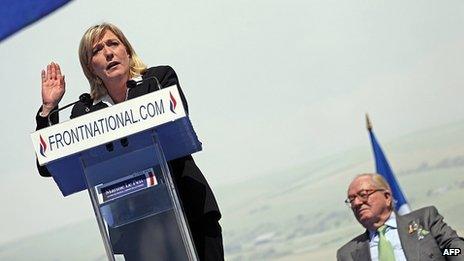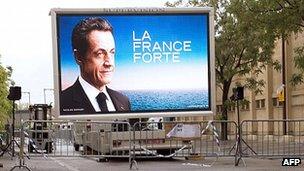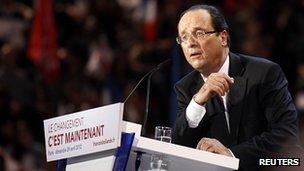May Day and the French election
- Published
- comments

Marine Le Pen inherited the National Front from her father Jean-Marie (right)
PARIS: Each year on May Day the far right in France stage a short walk to the statue of Joan of Arc - an icon for French nationalists.
Marine Le Pen, the leader of the National Front, walked with her supporters surrounded by camera crews. This year she was the centre of attention and thousands of her supporters turned up.
She sees herself as having new influence in French politics, after she won nearly 6.5 million votes in the first round of the French elections. Since then she has been courted - especially by President Nicolas Sarkozy. He needs many of her votes to stay in the Elysee Palace.
Today she told her supporters to vote according to their conscience. "You are free citizens," she told them. But her advice was to abstain. She would cast a blank vote.

Mr Sarkozy has reached out to the far right with a focus on immigration
She told the crowd: "Don't expect the other two parties to fulfil their promises. They are not parties of the people."
The second round of the election is on Sunday, when the contest will be between President Sarkozy and the Socialist candidate Francois Hollande. Mr Hollande remains ahead in the polls.
Ms Le Pen detests President Sarkozy and has little time for Mr Hollande. Both men she accuses of betraying the working people of France.
Even so latest polls suggest that around 45% of her supporters will back the president, around 35% will abstain and an estimated 20% will support Mr Hollande.
Whatever, she has already left her mark on French politics and on Europe. She has forced even Mr Hollande to address the issue of immigration. Her attacks on globalisation have struck a chord. President Sarkozy has said "I do not want to let France be diluted by globalisation... Europe has given in too much to free trade and deregulation".
President Sarkozy, who only recently was standing shoulder-to-shoulder with Angela Merkel in defending more powers for Europe, now accuses Brussels of "weakening the concept of the nation".
The president has been dragged onto the far right's territory - patriotism and French values. In a speech on Sunday he used the word "borders" dozens of times. In the bare-knuckle dialogue of the campaign he has been accused of using language from Vichy France and its collaboration with the Nazis. He, for his part, has accused Francois Hollande of marching in front of the "red flags" of a communist union.
There are indications that some in the Sarkozy camp are uneasy with his drift to the right. Polls suggest that almost half of the French people believe he has tacked too far towards the National Front.
The president is planning a rally at the Trocadero for today. This has infuriated the unions, who say that May Day traditionally is for workers' marches. President Sarkozy has irritated them further by saying that he will showcase "real work" - the implication being that the Left do not understand the value of work.
As for Francois Hollande, he has had to make far fewer concessions to the far left. Jean-Luc Melenchon, a former Socialist minister, only scored 11% in the first round and is politely asking that the front-runner not overlook the issue of the minimum wage. Mr Hollande has been able to stick closer to the centre ground, claiming that his campaign is about consistency while portraying President Sarkozy as "Mr Zig-Zag".

Francois Hollande has never held a ministerial post, but his promise of change has wide appeal
The investment banker Matthieu Pigasse, who is a co-owner of Le Monde, says "if Hollande wins with a big margin he won't need to pick ministers who are tokens of the far left".
Although the president needs some of the far-right voters to back him, their issues are not what voters say matter the most. Overwhelmingly their priority is the economy and jobs.
In the final days of the campaign the president will try and expose Francois Hollande as a dangerous tax-and-spender, untested, whose plans would only deepen the French economic crisis. He has used this card before without much success, but it will feature strongly at the crucial TV debate on Wednesday night.